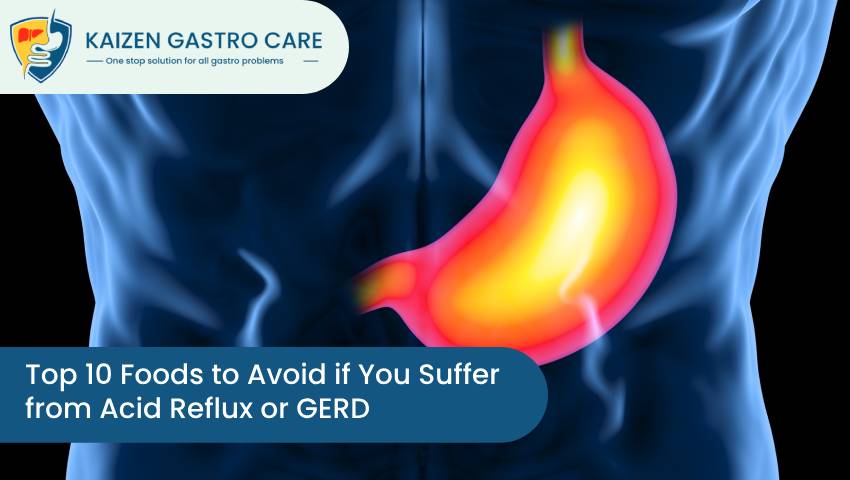
- 14/11/2024
- Kaizen Gastro Care
- 0 Comments
- Digestive Disorder
Top 10 Foods to Avoid if You Suffer from Acid Reflux or GERD
Acid reflux and GERD (Gastroesophageal Reflux Disease) are uncomfortable conditions indicated by heartburn, a burning sensation in the chest, and sometimes a bitter taste in the mouth. These conditions occur when stomach acid flows back up into the esophagus, causing discomfort and even damage to the esophageal lining. While medicines can help, dietary choices play a crucial role in controlling symptoms and preventing flare-ups.
At Kaizen Gastro Care Clinic, the best gastroenterology clinic in Pune, we prioritize educating patients about lifestyle modifications, especially food choices that can help reduce acid reflux symptoms.
Here are the top 10 foods to avoid if you suffer from acid reflux or GERD.
- Citrus Fruits: Oranges, lemons, limes, and grapefruits are acidic and can irritate the esophagus, leading to reflux symptoms. Try to limit or avoid these fruits, and consider gentler alternatives like bananas or melons.
- Tomatoes and Tomato-Based Products: Tomatoes are too highly acidic and can trigger reflux. Foods like pasta sauce, salsa, and ketchup are common culprits for heartburn, so opting for non-tomato-based sauces can help relieve discomfort.
- Spicy Foods: Spicy dishes, including those with hot peppers or high levels of seasoning, can irritate the stomach lining and increase acid production, aggravating reflux symptoms. If you love flavor, consider using mild herbs and spices instead.
- Fried and Greasy Foods: Fried foods slow down digestion and relax the lower esophageal sphincter (LES), the valve that keeps stomach acid from traveling back up the esophagus. Limit fried items like French fries, fried chicken, and onion rings to avoid triggering acid reflux.
- Chocolate: Chocolate includes caffeine and theobromine, both of which relax the LES, making it easier for acid to escape from the gut. Try substituting with other treats, like fruit or yogurt, to satisfy your sweet tooth without the reflux risk.
- Coffee and Caffeinated Drinks: Caffeine can relax the LES and prompt acid production. If you depend on coffee to start your day, consider switching to herbal tea or decaffeinated coffee to relieve acid reflux symptoms.
- Carbonated Beverages: Sodas and fizzy drinks increase the amount of air in the stomach, which can lead to bloating and reflux. The carbonation can also trigger burping, pushing acid back into the esophagus. Opt for still water or herbal teas as an alternative.
- Alcohol: Alcohol relaxes the LES, helping stomach acid to flow back up more smoothly. Beer, wine, and spirits can all improve reflux symptoms, so it’s best to limit or avoid alcohol if you’re prone to acid reflux.
- High-Fat Dairy Products: Cheese, butter, and heavy cream are high in fat, which can delay stomach emptying and put pressure on the LES. Choose low-fat or non-dairy options to avoid triggering heartburn.
- Onions and Garlic: While healthy in general, onions and garlic can upset the digestive tract and cause heartburn, especially when eaten raw. Cooking them may help relieve this effect, but it’s best to limit them if you’re sensitive to these ingredients.
- Mint and Peppermint: While mint and peppermint can relieve an upset stomach, they can actually relax the LES and trigger acid reflux in individuals with GERD. Avoid peppermint-flavored foods, teas, and chewing gum if you’re sensitive to reflux.
Additional Tips for Managing Acid Reflux:
While avoiding these foods can significantly help in controlling acid reflux, here are a few more tips to keep symptoms at bay:
- Eat Smaller Meals: Large meals can put pressure on the LES, causing acid to reflux into the esophagus. Eating smaller, more routine meals can ease this pressure.
- Stay Upright After Eating: Avoid lying down for at least two hours after dinner. Gravity helps keep stomach acid down, so consider a short walk after eating.
- Maintain a Healthy Weight: Extra weight, specifically around the abdomen, can increase pressure on the stomach, pushing acid into the esophagus. Losing even a small amount of weight can help ease symptoms.
- Wear Loose Clothing: Tight clothing around the abdomen can put pressure on the stomach and enhance the likelihood of reflux.
- Avoid Eating Before Bedtime: Eating late at night can worsen reflux symptoms. Aim to stop eating at least 2-3 hours before going to bed.
Conclusion:
Managing acid reflux and GERD often starts with mindful eating. By avoiding these common trigger foods, you can reduce the risk of heartburn and enjoy a more comfy digestive experience. For personalized guidance and treatment for acid reflux or GERD, consult with our best GERD specialist in Pune at Kaizen Gastro Care Clinic. We’re here to help you take control of your health and make informed choices that support a comfortable, balanced lifestyle.
For more information or to schedule an appointment, reach out to Kaizen Gastro Care Clinic today.
